 MyCatBreeds
MyCatBreeds Both Safari and Exotic Shorthair are originated from United States. Both Safari and Exotic Shorthair are having almost same weight. Safari may live 3 years more than Exotic Shorthair. Both Safari and Exotic Shorthair has same litter size. Both Safari and Exotic Shorthair requires Low maintenance.
Both Safari and Exotic Shorthair are originated from United States. Both Safari and Exotic Shorthair are having almost same weight. Safari may live 3 years more than Exotic Shorthair. Both Safari and Exotic Shorthair has same litter size. Both Safari and Exotic Shorthair requires Low maintenance.
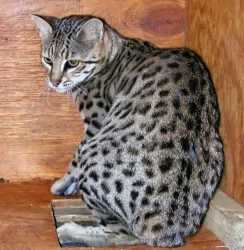 The Safari Cat, hailing from the USA, is one of the rarest breeds of cats. There are only about 70 of these cats registered at the International Cat Association.
The Safari Cat, hailing from the USA, is one of the rarest breeds of cats. There are only about 70 of these cats registered at the International Cat Association.
The Safari cat is a mix of a moggy and Geoffroy's cat. At first, the cat was used for research purposes by Washington State University but then cat breeders took over the development of the breed.
The name ‘Safari’ was chosen because of its wild look.
 The Exotic Shorthair cat is such a sweet-faced cat that it is often referred to as the ‘lazy man’s Persian. This is because the face is also flat and pushed in like the Persian cat.
The Exotic Shorthair cat is such a sweet-faced cat that it is often referred to as the ‘lazy man’s Persian. This is because the face is also flat and pushed in like the Persian cat.
The Exotic Shorthair was in fact developed as a short-haired version of the Persian. It was in the 1950s that the Persian was used to mate with other breeds such as the Burmese.
The crossbreed gained recognition but some American Shorthair breeders produced a new breed standard that would disqualify American Shorthairs that showed any signs of crossbreeding.
It was in 1966 that the Cat Fanciers Association recognized the cat as a new breed and under the name Exotic Shorthair.
 The hybrid Safari cat is a medium to large-sized cat that at first weighed in the region of 15kg, but the cat now weighs roughly 11kg.
The hybrid Safari cat is a medium to large-sized cat that at first weighed in the region of 15kg, but the cat now weighs roughly 11kg.
Its body is much like that of the wild parent, the Geoffroy – muscular and compact. The ears aren’t particularly large and are smallish, rounded ears with a fairly broad head.
It has a typical wild cat look and is a spotted or rosetted cat breed. Below the spots, the coat is a silvery grey shade.
The coat which is short actually comes in a variety of colors that come from both cat breeds. The eyes of this cat are either yellow or green. The Safari cat certainly has a wild cat appearance, because of the cross-breeding. This is a rare cat and because of this, there is no breed standard for it.
They can live to be between 17 and 20 years of age.
Even though one of the parent breeds is a wild cat, the Safari cat is described as an easy-going cat that can make a good pet.
The cat is very intelligent and playful and will enjoy swimming and climbing. It is for this purpose that he needs to have quite a large outside enclosure with a pool of sorts so that he can paddle.
There isn’t much information on their interaction with children and other pets in the home. While they are quite likely to make good pets where there are children, there would have to be supervision where there are small children. During play, these cats can bit. It would be extremely important to teach children to respect any animal and to be gentle and kind to them.
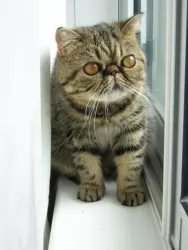 Developed through crosses between Persians and American Shorthairs as well as other cat breeds, the Exotic Shorthair looks like the Persian but he has a short coat.
Developed through crosses between Persians and American Shorthairs as well as other cat breeds, the Exotic Shorthair looks like the Persian but he has a short coat.
The coat is found in the same colors as the Persian cat – patterns and solid colors, ranging from chinchilla silver to tabby, tortoiseshell, black and white and bicolor. The eyes are large and round, the ears small and round and the tail fairly short and thick.
The Exotic Shorthair is a sweet, gentle, calm cat but a bit livelier than the Persian. They’re lively, friendly, and playful, but are also cats that like to sit in your lap and be stroked.
They get on well with children and other pets, being a loyal friend to the entire family. He quietly communicates with his human family with a soft voice. He is also quite adaptable to living conditions so long as his human family provides him with lots of attention.
He won’t want to be left for long periods of time on his own so he won’t suit living in a home where he is left alone all day.
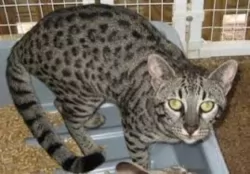 As a hybrid cat, your Safari is interesting alright, but unfortunately, you can’t ever be 100% sure of a hybrid cat. It needs careful consideration before you bring one into your home.
As a hybrid cat, your Safari is interesting alright, but unfortunately, you can’t ever be 100% sure of a hybrid cat. It needs careful consideration before you bring one into your home.
Apart from coming into the home from time to time, hybrid cats need an outside enclosure too that is securely fenced and gated and with a roof.
You made a decision to buy a cat with a wild side. It may live up to all your expectations but it may not either.
When you do research you find that the biggest number of behavioral complaints from owners of hybrid cats are about aggression issues and the refusal to use a litter box when indoors.
There is still a raging debate going on as to whether hybrids make suitable pets, but when you bring any animal into your home, as a responsible adult it is your job to provide well for it to ensure its happiness.
 Your Exotic Shorthair is a loving cat and for those who prefer, it is a cat that is livelier than the Persian. While the Exotic Shorthair also has a mellow personality, because of its shorthair ancestors, it's more active.
Your Exotic Shorthair is a loving cat and for those who prefer, it is a cat that is livelier than the Persian. While the Exotic Shorthair also has a mellow personality, because of its shorthair ancestors, it's more active.
This Exotic cat can live to be 15, 16, or 17 if you care for him well and that means you have 15 years to share with a most wonderful feline companion.
 The Safari cat isn’t a particularly well-known breed so there isn’t much information on their health. They can suffer from the same illnesses as non-hybrid domestic cats.
The Safari cat isn’t a particularly well-known breed so there isn’t much information on their health. They can suffer from the same illnesses as non-hybrid domestic cats.
Certain hybrid breeds, such as the Safari, can sometimes have issues with reproduction as some cats are infertile. Domestic cats and wild cats have a different number of chromosomes and this results in reproductive problems, and stillbirths are quite common.
 With the Exotic Shorthair, some of the diseases are genetic while others can be encouraged by poor diet and lifestyle.
With the Exotic Shorthair, some of the diseases are genetic while others can be encouraged by poor diet and lifestyle.
Obesity for instance is a major disease of cats and it contributes to many serious illnesses in cats. Excess weight shortens your cat’s life and contributes to arthritis and diabetes. The extra weight puts a strain on the cat's joints. Shedding just a little bit of weight can result in improved mobility.
Dental disease is a common chronic problem in pets. Make sure to check inside your cat’s mouth from time to time as serious dental problems can cause pain and interfere with the health of your cat’s important organs such as heart and kidneys.
All kinds of parasites can invade your Exotic Shorthair's body, internally and externally – worms, fleas, and ticks - and cause your pet a tremendous amount of pain and discomfort.
Brachycephalic Syndrome is a respiratory distress syndrome and it mostly affects what is known as brachycephalic cats – those cat with snub faces like the Exotic Shorthair.
The flattened features of the face make it that there is less space for the tissue to grow. The soft area at the back of the roof of the mouth hangs into the airway, obstructing it, and they can’t breathe normally. Sometimes the cats will require surgery to allow for more regular breathing.
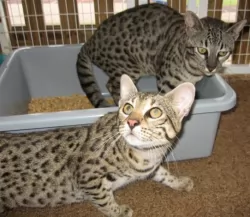 It is recommended that you brush this cat each week. He isn’t a big shedder but the brushing once a week keeps the fur in good condition, removing loose hairs and dust.
It is recommended that you brush this cat each week. He isn’t a big shedder but the brushing once a week keeps the fur in good condition, removing loose hairs and dust.
A high protein diet is imperative. Cats are carnivores and a meat diet is imperative. You can speak to your vet or a cat expert about feeding your Safari cat. Certainly, they need to be fed high-quality cat food. These foods are available in wet and dry form.
He will definitely need some raw meat. Make sure you understand the ingredients in some low- quality cat foods as corn for cats can be a problem for them, hard to digest and it could cause intestinal problems.
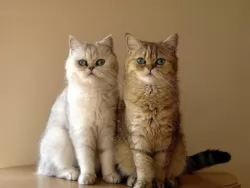 It is important to understand the type of foods available to your pet and how often and how much to feed him.
It is important to understand the type of foods available to your pet and how often and how much to feed him.
Most cats prefer to eat several small meals a day as opposed to a couple of large ones. Make feed times interesting and provide food puzzles to have your cat ‘prey’ for food.
Always read and understand the labels on the cat food packaging and be sure to always feed your Exotic Shorthair with the very best food there is and to follow the portion guides.
If you’re in any doubt or your cat doesn’t want to eat his food, try something else or speak to your vet about how to be sure your cat is getting fed the best food there is.
Make sure to have your kitten vaccinated as required. Also, when you take your kitten in to be vaccinated, the vet will also perform a check-up to make sure your kitten is healthy as these cats are susceptible to bacterial and viral infections.
Your cat has a short, low maintenance coat. A brush once a week can get rid of loose hairs and you and your cat will both enjoy the therapeutic bonding between the two of you.
Check your cat’s inner ears for wax and debris as well as for signs of any infection, and if you don’t want to do that, professional cat groomers can do it for you.